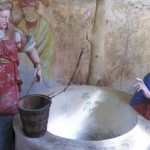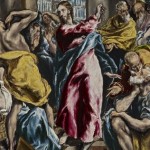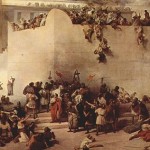 2 Thessalonians 2:1-12
2 Thessalonians 2:1-12
There are a number of interpretations of what St. Paul is referring to when he speaks of the Day of the Lord, the son of perdition, and other things. To do justice to presenting my own understanding would detract from the devotional nature of these meditations, and yet it is necessary in this passage to offer some background.
When reading the Bible, we must always remember to place any given text in its proper context, which includes the surrounding verses and chapter, the entire book (remembering that there were no chapter and verse divisions in the original books of the Bible), the entire Bible, and the literary, historical, and cultural situation in which the book of the Bible was written and received.
When we read Old Testament, we understand that we must work to apply it to ourselves because things have changed. But when reading the New Testament, too often we assume that things for us will be exactly like 1st century, without any effort to apply to our circumstances.
The first thing we should understand about 2 Thessalonians 2, then, is that Paul is writing to a specific church, the one in Thessalonica, in the first century, because they had questions about the Day of the Lord and related ideas. Paul expects the 1st century Thessalonians to understand what he is talking about and see how it applies to them.
In trying to understand it ourselves, we have a basic choice to make regarding what Paul meant. The Day of the Lord and the Man of Perdition could refer to things that were to happen shortly and that the Thessalonians could expect to understand and experience. For example, the son of perdition would sit as God in thetempleofGod, which stood only until A.D. 70. In this case, the immediate context that Paul is speaking about is now past, and we have to interpret what the passage means for us today.
On the other hand, the things Paul is speaking about could be things still future to even us who live 2000 years later, things that (since we’ve waited for them 2000 years) are also unlikely to be directly about our own generation.
In either case, the point for us is the same: that Paul is not specifically prophesying about events in the year 2011, any more than he was talking about events that were about to happen in 1970 when The Late Great Planet Earth was written (we are now 2 generations after that book.) In either case, however, we must find an application for today, for surely this passage speaks to us today, as does all of Scripture.
We can all affirm that like the Thessalonians, there is evil in our culture and generation. There are certainly antichrists in our culture, there are those who exalt themselves above God, and there is lawlessness. We have an increasing number of people who claim the divine is inside them (and they don’t mean the Holy Spirit), and in American culture, there is little argument that as a whole we are more lawless than we used to be. Even among Christians there are those who proclaim that Jesus Christ can be our Savior without being our Lord and those who say that since we are under grace and not law it doesn’t matter how we live (which is antinomianism or lawlessness.) In other words, we all intuitively understand that we are facing the same problems the 1st century Thessalonians faced.
One of the most revealing things about my recent studies in the sociology of religion, especially in the historical sociology of Christianity, as well as my reading in church history is this world-shattering (if you live in a little, fragile world like I do sometimes) conclusion: that every generation and every culture is decadent and filled with miserable sinners who are making the world worse than how they found it. For example, while the Middle Ages might be seen as a high point of the influence of Christianity over culture, we must consider not only the terrible problems of the Church that necessitated a drastic Reformation, but we might also wish to consider that once you begin looking outside of the educated elite who remained faithful, there was an enormous amount of spiritual ignorance, apathy, and rebellion.
We might even assert (well – I might assert it – I won’t drag you into my intellectual adventures) a First Spiritual Law of Thermodynamics, which is that “The spiritual entropy of the universe tends to a maximum.”
In other words, spiritually, things are running down and getting worse. And they have been for thousands of years. But if St. Paul thought so, and we think so then how come the end hasn’t come? I don’t think that when most of us look at the 1950s we think that things had gotten much, much worse than things were in the Roman Empire. In other words, the world can’t be running down spiritually in a straight downward line. In fact, in some ways, we have to admit that they are spiritually getting better. Every time someone is made a Christian, the world has gotten better spiritually, and there are a lot more Christians around today than ever before, and over a larger part of the earth than ever before.
This means we have to assert a Second Spiritual Law of Thermodynamics which states: Jesus Christ is the same yesterday, today, and tomorrow, and His Body, the Church, is always inhabited by the Holy Spirit and is always being regenerated, reformed, and revitalized, just like any living body.
This means that not only is the world getting worse whenever evil men and lawlessness prevail but also that it is getting better whenever the Kingdom of God is established by men who turn to Christ and live as faithful disciples.
The bottom line for the Christian is this: though the sons of perdition and the men of lawlessness may attempt to sit as God in the temple of God, the fact is that Jesus Christ is enthroned at the right hand of the Father in the true Temple not made with hands. This is our response to the evil around us: to remember and turn to God and resolve to lead holy lives in His kingdom.
That Jesus Christ, the King of kings, is on the throne and that Jesus Christ will come again for His saints are the ultimate realities for every creature. And they are our realities this very day, regardless of the sin and lawlessness of others.
Prayer: Lord Jesus, I praise You because You sit at the right hand of the Father, enthroned in heaven. Look down upon me with mercy this day and calm whatever fears I have about the progress of evil men in Your world. Increase my faith and encourage me in all righteousness that through my life Your kingdom may be established here on earth as it is in heaven.
Points for Meditation:
What evils did the 1st century of St. Paul’s letters and ours have in common? Meditate on how Paul counseled the churches to respond to the evil and trouble in their lives. Apply this counsel to your own life and times.
Resolution: I resolve to remember the eternal and heavenly reality today, that Jesus Christ is on the throne and that the Lord is in His holy Temple.
© 2011 Fr. Charles Erlandson
CC Image courtesy of Librarian by dbking on Flickr.jpg












